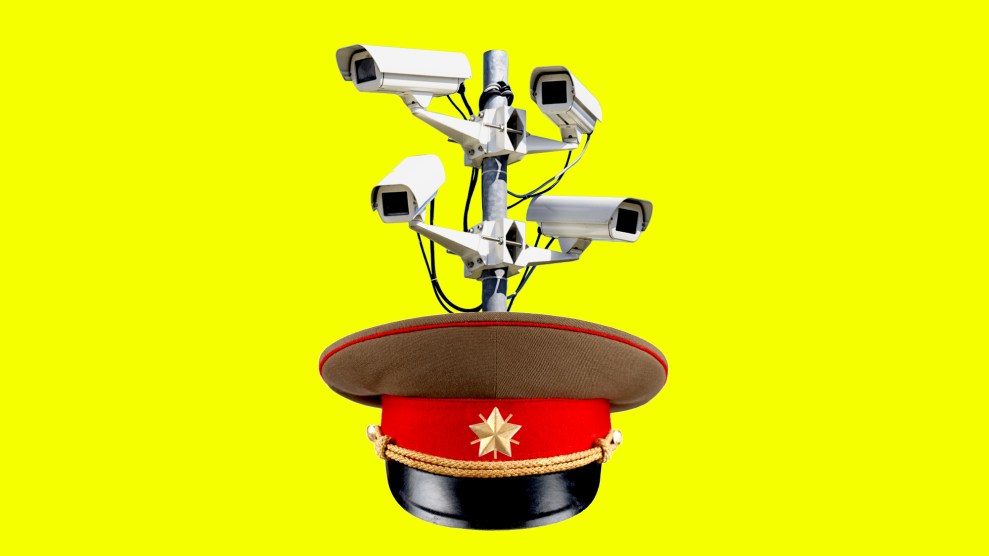
Mother Jones illustration; Getty
Is the federal government helping companies sell surveillance technology to repressive governments? Sen. Ron Wyden (D-Ore.) wants to know, but a federal subagency has been cagey about the information.
In a letter sent on Friday, Wyden asked the International Trade Administration (ITA), a subagency of the Department of Commerce, for details about its role in helping US firms sell their surveillance technology to other countries. In the letter, Wyden—a privacy-minded lawmaker who chairs the Senate Committee on Finance—noted that he had been asking for an answer on the matter since last summer.
In August of 2022, the ITA confirmed to Wyden that it “provides assistance” to companies selling surveillance technology. But when asked, the subagency, Wyden writes, “did not provide details on these activities” or the specific help ITA has offered because of “unspecified legal barriers to revealing more [information].” In theory, this work falls within ITA’s purview of promoting US exports: ITA’s website touts that it will help companies compete in foreign markets on everything from “Steel” to “Aerospace and Defense.” But that does not account for the potential buyer: repressive regimes looking to crack down on civil liberties.
Wyden has good reason for suspicion. When the ITA published posts on its website showcasing arenas that are ripe for surveillance and security technology sales, the countries mentioned include not only obvious allies like the United Kingdom, but also others with a history of abusing surveillance technologies, including Honduras, the Philippines, and India.
Amnesty International has warned of the possible harms of India’s growing appetite for surveillance technology, which is particularly concerning in light of the increased persecution of Muslims in the country. In its market intelligence post on India, the ITA did not mention this repression. Instead, in February, the ITA told US firms that the “surveillance systems market in India is growing” and “provides opportunities for U.S. exporters.” Another post on “India’s surveillance and security market” noted “huge opportunities for U.S. companies,” and that “surveillance systems are in demand across all sectors.”
Surveillance tools have been used in Honduras to preserve state power and the drug trade. An ITA post on the country in 2021 noted that the country’s desire to reduce homicide and crime is an opportunity for security technology firms. The president of the Philippines, Rodrigo Duterte, has for years used surveillance technology, potentially abusing human rights. Still, in 2020 ITA promoted the Filipino market as “an opportunity in projects that require high-end, advanced, and sophisticated technology such as airport security screening solutions.” Posts from the ITA include notes at the bottom encouraging US security and surveillance companies to contact agency officials to “learn about the security and technology opportunities” in the case of Honduras, and for “further information” regarding the sector in the case of the Philippines and India, providing emails for specific staff.
Wyden noted in the letter that at the March meeting the ITA mentioned a forthcoming policy that would govern how the subagency’s staff would “interact with surveillance technology providers going forward” but has not been provided specifics.
The ITA did not respond to a request for comment.
The Biden administration has signaled that it has an interest in curbing human rights abuses abetted by technology, supporting the 2021 U.S.-EU Trade and Technology Council Joint Statement—which calls for the “deployment of new technologies in ways that … respect universal human rights,” and “upholding freedom of expression and privacy rights,” among other protections.
“Given the [Biden] Administration’s stated interest in limiting the human rights abuses made possible by these technologies, ITA must be transparent about its past and current promotion of these technologies abroad,” Wyden wrote.


















